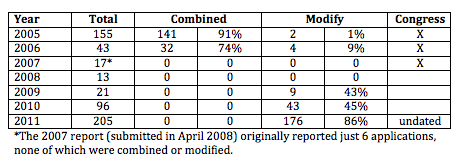Was DOJ Hiding a Section 215 Gun Registry from Congress?
Among other documents, ODNI released on Monday all the Attorney General Reports on Section 215 use from 2005 to 2011 (2006, 2007, 2008, 2009, 2010, 2011, 2012).
This is the classified version of a report that also gets released in unclassified form as part of a larger report to Congress on FISA numbers (2005, 2006, 2007, 2008, 2009, 2010, 2011, 2012; ODNI did not release the report covering 2012 because it lay outside the scope of ACLU’s FOIA). And the paragraph of each of these reports that lays out the following information remains redacted in all of them.
(3) the number of such orders either granted, modified, or denied for the production of each of the following:
(A) Library circulation records, library patron lists, book sales records, or book customer lists.
(B) Firearms sales records.
(C) Tax return records.
(D) Educational records.
(E) Medical records containing information that would identify a person.
Nevertheless, the reports show us two new things.
First, while we knew the number of modifications has gone up significantly in the last three years (we now know that many of the modifications in 2009 had to do with phone dragnet violations), the latest reports ODNI released say this:
The FISC modified the proposed orders submitted with forty-three such applications in 2010 (primarily requiring the Government to submit reports describing implementation of applicable minimization procedures).
The FISC modified the proposed orders submitted with 176 such applications in 2011 (requiring the Government to submit reports describing implementation of applicable minimization procedures).
Julian Sanchez had speculated that’s what was going on in a post (I can’t find the link right now) noting that NSL use had halved while Section 215 use had gone up. Remember, too, the government has not released a 2010 opinion on Section 215 that may explain why the FISC got much more involved in policing the government’s minimization.
Still, it is almost certain that the need to double check government minimization stems from bulk collections. If those bulk collections were also on a 90-day renewal cycle, then we might be looking at 44 bulk collection programs in 2011.
One more thing. As was reflected in the ACLU Vaughn Index, it appears DOJ never provided these reports to Congress starting with the report covering 2008. It did do so for the report covering 2011, but the report isn’t dated, so it’s not clear it was done in April 2012, when it should have been provided to Congress. Furthermore, that production was cc’ed to John Bates, which the tardy August 16, 2010 production of FISC opinions also was, which makes me wonder whether Bates had to force the Executive to fulfill the requirements in the PATRIOT Reauthorization (both these reports and the pre-2008 “significant constructions of law” requirement stems from the 2006 reauthorization). [4/19/14 correction: The “significant constructions of law” stems from the FISA Amendments Act]
Now, maybe DOJ was just being lazy in not fulfilling the clear legal requirement. But given that it seems to have had no problem fulfilling the requirement for unclassified numbers during the same period, I wonder whether DOJ just didn’t want to reveal that it was collecting on one or more of the specified categories, such as firearms sales records (though I’ve long wondered whether DOJ was also collecting DNA records).



